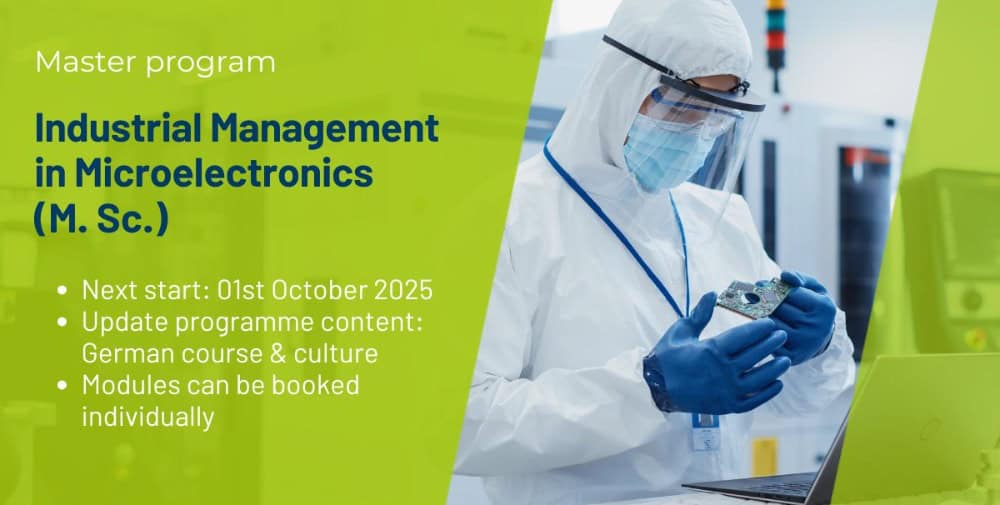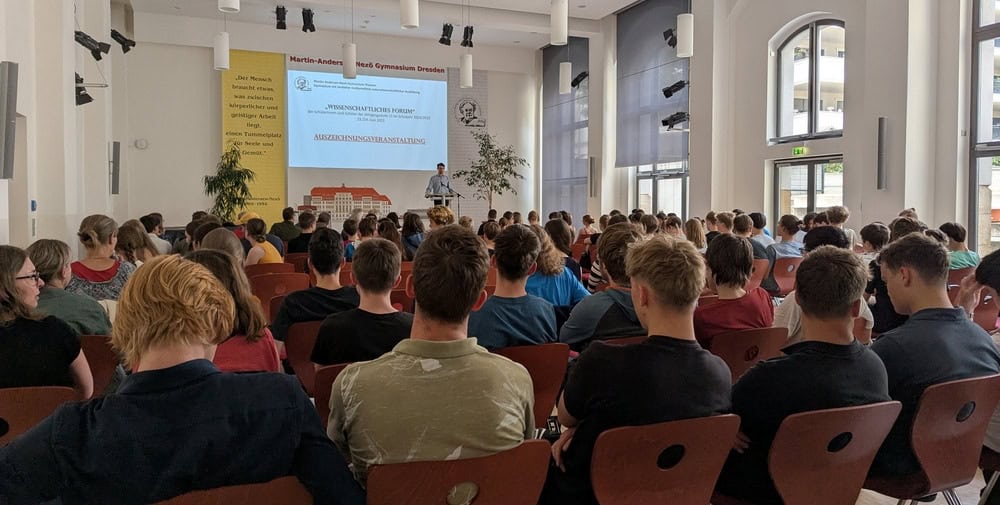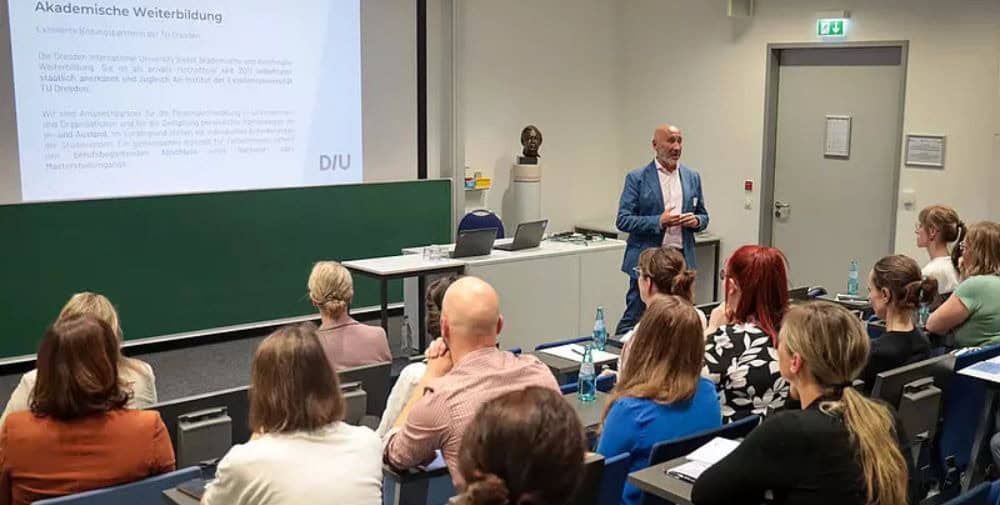
The PerspektiveArbeit Lausitz (PAL) structural change project is all about supporting companies in the introduction of data-based assistance systems and AI applications. In your opinion, how important is the digitalization of small and medium-sized enterprises (SMEs) in your home region?
Laura Staudacher: It is hugely important for the many small and medium-sized enterprises in Lusatia. SMEs often don’t have the internal resources for digitalization processes and therefore need external support. Digitization not only helps them to become more productive, but also to be attractive as an employer for young people who are looking for a job in the region that deals with exciting future technologies, for example.
How important is it to young people that their employers are technologically advanced and digitally positioned?
Laura Staudacher: Young people expect companies to make use of the opportunities offered by digitization and not produce unnecessary mountains of paper. It’s clear that Lusatia can’t keep up with companies in the major cities – and perhaps doesn’t need to. Nevertheless, or perhaps precisely because of this, companies in Lusatia need to think about what they can offer, how they can create a modern digital working environment, ensure a good work-life balance and leave room for voluntary work, for example. Digital tools are also becoming increasingly important in the context of training international specialists. Even if German is not their native language, they can be integrated into processes more easily with the support of such tools.
It is often claimed that older employees in particular are worried that robots or AI applications will take their jobs in the future. How do you see this from the perspective of young people, whose professional future will be much more affected by this?
Laura Staudacher: I haven’t really noticed this yet, and it is actually an irrational concern. We can see that new and sometimes even more jobs are being created as a result of the disruption of the world of work. Of course there are also job profiles, particularly in the low-wage sector, that will be taken over by machines or technologies in the future. However, this is precisely why I also see a great opportunity here to qualify people for jobs that cannot be replaced by technology in times of skills shortages. My impression is that young people are currently very aware of the market situation. They know exactly that they are a scarce resource as employees and are very self-confident on the job market.
Generation Alpha will also deal with AI in a completely different way. They are already gaining their first experience of using it at school. In my view, there is still a lot of untapped potential here. One teacher cannot look after 30 students individually. But with the support of AI solutions, learning processes could be made more individual.
You come from Lusatia and returned to your home region after studying in Dresden. Nevertheless, you don’t work in the region, but in the capital. How do you manage the balancing act between the big city and rural areas?
Laura Staudacher: It’s certainly not a model that’s suitable for everyone. Although I commute to Berlin from Lusatia, I work from home several times a week. I think it’s very important that Lusatia’s fast rail and road connections are further expanded. I think many young people like living in the countryside, not only because the purchase and rental prices are lower, but also because it is really relaxed and leaves plenty of room for free development.
In a survey of young people in Lusatia at the beginning of the year, the German Trade Union Confederation found that although three out of four people think Lusatia is attractive, only 50% want to stay in the region. Why do you think that is?
Laura Staudacher: We are also very aware that many young people want to leave once they have finished school. In my view, that’s actually a good thing. They get new impetus, gain qualifications elsewhere and, we hope, then come back home as cosmopolitan, progressive and well-qualified specialists who build something here.
It would be interesting to compare this with other rural regions in Germany, particularly in terms of the return rate. Because I think that young people moving away after leaving school for the reasons mentioned is an issue in all rural regions.
Tourism is already part of the change and has managed to position itself positively. Now industry and business, but above all technology and young companies, should follow suit. How do you assess the current development and what do you think is necessary to create and secure the change towards an economic and scientific region with a dynamic start-up scene in the long term?
Laura Staudacher: In my view, this is an absolutely important topic and a big task for all of us to make many more young people want to build something for themselves. I’m not thinking so much about technology start-ups – it could also be a café or a craft business, for example. Of course it’s interesting for start-ups to be in Berlin, that’s where the capital is, that’s where the networks are that support them. One solution could be regional venture capital funds, for example a Lausitz Fund, in which companies give money to provide seed capital for young companies that pay it back later. We’re not even talking about multi-million sums, but much smaller sums, perhaps 20,000 or 50,000 euros, that are needed to start or scale up a company.
In addition, you have to look strategically at what the municipalities offer and what start-ups need. For example, there is space for production. Here, the local authorities could set out and offer their areas, which are much cheaper compared to Berlin.
And then, of course, skilled workers are also needed to set up here – making it all the more important to keep young people here or bring them back after their training.
You founded the “Young Lusatia” network to “kiss structural change in the East awake”. Why is the prince still asleep?
Laura Staudacher: I’m actually speaking mainly for the Brandenburg side, as we’ve already had more experience there. In itself, the process is well thought out. I see a great opportunity for a region here. Coal is a finite resource. So it was clear anyway that at some point it would no longer be available or that extraction would become uneconomical. In a situation like this, to say that we will politically determine the end in a compromise, but provide the region with several billion euros so that it can develop itself further in a participatory process, offers great potential. In my view, however, what is needed is even more clarity for civil society as to where it can contribute ideas and feedback. We know that only a fraction of what politicians communicate actually reaches citizens. As a network, we try to be a mediator and point of contact for both sides.
We are lucky that the younger generation did not experience the first structural change process at the beginning of the 1990s. A lot was promised back then and there was a lot of disappointment. We perceive that the younger generation is therefore more open to the current change and can engage more actively with the opportunities to help shape it than perhaps our parents’ generation. However, I fear that very few of them know how they can get involved. We would like to change that.
Your aim is to turn Cottbus into a “Heidelberg of the East”. How do you want to go about this and when do you want to have achieved this goal?
Laura Staudacher: My vision of Cottbus: a recognized university city in an innovative region, as the center of Lusatia, so to speak. There are a few cities that are about the same size as Cottbus and are very popular with young people as places to study – Heidelberg, for example, but also Marburg or Göttingen. Unfortunately, Cottbus is not one of them. That should change. Cottbus is a great city to study in. There are many exciting potential employers in the surrounding area. The same applies to young people who want to do an apprenticeship rather than study. We need to set the course for this now.
With the announced large-scale research centers, state-of-the-art facilities are being created in Lusatia that can attract highly qualified specialists from all over the world. How well prepared is Lusatia for this? And how open are the people of Lusatia to the topic of immigration?
Laura Staudacher: Of course there is the loud – I think – minority that says “we are self-sufficient here, we don’t need anyone”. But anyone who pays a little attention to the labor market situation knows that this is not true at all and that we are dependent on immigration into the labor market if we want to maintain our prosperity.
I would like to see a kind of cosmopolitan local patriotism. That people in Lusatia say: “It’s really nice here. That’s why we want more people to come here”. Unfortunately, many companies are not yet ready for this; for example, they are not open to English-speaking employees. The more difficult it becomes to find trainees and skilled workers, the more companies will have to open up. Large employers in the region are already doing this.
You have drawn up a list of demands – what does it say?
Laura Staudacher: We have formulated five specific ideas for structural change. For example, for a training campus for vocational training in Lusatia, preferably close to a university, so that theory and practice can be more closely interlinked. New training professions should also play an important role here, for example for “green professions”, i.e. jobs in future-oriented industries such as the production of hydrogen. We present these and other ideas in detail on our website and discuss them with decision-makers, representatives of public administration and young people from the region.
What we also absolutely need, however, are framework conditions in which young people can live in the region. This is not a specific structural change issue. It’s about such banal questions as: “Can I get home safely after a party in the middle of the night?”. We also need housing for young people, for example building land for young families and educational housing for trainees and students that is suitable for shared flats.
What specific tips do you have for companies in Lusatia?
Laura Staudacher: They have to face up to the reality of the job market. Too many are still too stuck in the past, when they received 50 applications for one vacancy. It is important to work on your own attractiveness. I know that not every company can do this by offering a high salary. But there are also other factors, such as promotion opportunities or even the prospect of company succession, that make a job attractive. And it takes courage, for example, to try out digital working or new working time models, such as a four-day week with nine or ten hours each.
Dear Laura, thank you for taking the time to talk to us!
In conversation with Laura Staudacher: Katrin Meusinger, Silicon Saxony e.V., PAL network partner
– – – – – –
Further links
👉 https://pal.webspace.tu-dresden.de
Photo: Young Lusatia




